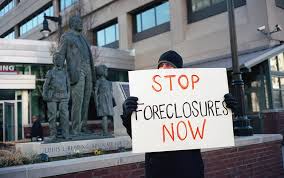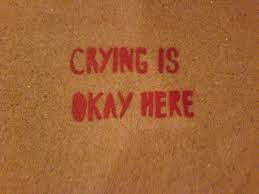Study Shows Foreclosure-related Suicides Doubled, 2006 – 2010

Well, finally, (at least as far as I’m concerned) the American Journal of Public Health has published the results of a comprehensive study on foreclosure- and eviction-related suicide, which it should come as little surprise, shows has more than doubled since 2006.
First I’ll look at the study’s authors, design, methodology and conclusions. Following that, I’ll share my thoughts on the study and the subject matter.
As stated on the publication’s Website, “the American Journal of Public Health (AJPH) is dedicated to the publication of original work in research, research methods, and program evaluation in the field of public health. The mission of the journal is to advance public health research, policy, practice, and education. AJPH, first published in 1911, is the official journal of the American Public Health Association.”
The study’s title is: “Increase in Suicides Associated With Home Eviction and Foreclosure During the US Housing Crisis: Findings From 16 National Violent Death Reporting System States, 2005–2010.”
The study’s objective was “to determine the frequency, characteristics, and precipitating circumstances of eviction- and foreclosure-related suicides during the US housing crisis, which resulted in historically high foreclosures and increased evictions beginning in 2006.”
The study “examined all eviction- and foreclosure-related suicides in the years 2005 to 2010 in 16 states in the National Violent Death Reporting System, a surveillance system for all violent deaths within participating states that abstracts information across multiple investigative sources (e.g., law enforcement, coroners, medical examiners).”
This particular study was authored by Katherine A. Fowler, PhD, R. Matthew Gladden, PhD, Kevin J. Vagi, PhD, Jamar Barnes, MPH, and Leroy Frazier, MSPH. Among many other things, the study’s authors, who were from the Division of Violence Prevention and Centers for Disease Control and Prevention, stated that…
“Most suicides occurred before the actual housing loss (79%), and 37% of decedents experienced acute eviction or foreclosure crises within 2 weeks of the suicide.”
The study, not surprisingly if you ask me, concluded…
“Housing loss is a significant crisis that can precipitate suicide. Prevention strategies include support for those projected to lose homes, intervention before move-out date, training financial professionals to recognize warning signs, and strengthening population-wide suicide prevention measures during economic crises.”
So, public health officials are now trying to measure the toll that the housing crisis has taken in terms of lost life and psychological distress. This was the first study to “systematically examine suicides linked with eviction and foreclosure.”
Citylab.com, a publication from The Atlantic, reported on the study, stating…
Foreclosure-related suicides more than tripled between 2005 and 2010. “This further suggests a relationship between these suicides and the housing crisis, which resulted in a national 389 percent increase in foreclosures between 2005 and 2010,” the report reads.
And similar findings can be seen worldwide…
“A recent study examining the impact of austerity measures taken in England during the European financial crisis on unemployment and subsequent suicides attributed more than 1,000 excess suicides to these economic conditions between 2008 and 2010. Another found that in Greece, one of the worst-hit economies in Europe, suicide mortality rates among men have increased by more than 22 percent since 2007. Similar trends were observed in several countries (e.g., Japan, Hong Kong, South Korea) following the Asian monetary crisis of 1997.”
According to Citylab.com, “this CDC study might be the first to search for a direct link between severe housing distress and suicide.” Hopefully it won’t be the last.

My thoughts on the study and the subject…
For one thing, I have to say that it’s about time such a study has been conducted. It’s long overdue, not that I’m sure it would have mattered had it been done sooner.
For another, I’m sure that for those who have been intimately involved in following the foreclosure crisis over the last six years, this hardly seems like “news.” Personally, I didn’t need a study to tell me that foreclosures were causing an increasing number of suicides… or divorces… alcohol consumption or prescriptions written for anti-depressants. I’m quite certain that all of those things have increased over the last six years too.
The other thing that’s worth noting is that the study likely is under-reporting the incidence of foreclosure-related suicide because data from only 16 states were used, and that means that only 27 percent of total U.S. suicides were examined. California, for example, was not included.
In addition, as Citylab.com explained, “CDC researchers were able to identify cases of suicides related to housing as distinct from those related to other financial pressures—unemployment, rising health care costs, bankruptcy, and so on—but some number of suicides may have gone undetected because they were not coded as such.”
Okay, but so what? Yes, suicide is a complex subject. It’s never caused by any one thing… and it’s always hard for others to understand… but what the study shows should be more than enough to make its point.

Here’s my problem with the whole thing…
The study talks extensively about foreclosure and eviction, and even specifically mentions the stress that comes from “a lack of control over outcomes,” but from what I could see, fails to mention what people specifically go through when in the loan modification process… and there should be no question… THAT is a MAJOR contributor of the stress people are being forced to endure.
Many have called it a form of “torture.”
Citylab.com also quoted the study, which stated that…
Disturbingly, the study suggests that the mechanism of foreclosure proceedings might actually lead to increased risk for suicide:
Foreclosure may be exceptionally stressful because of its protracted nature and multiple negative events that constitute the process, particularly given the evidence that situational depression may respond in a dose-response fashion to negative life events. In addition, depression is more strongly related to stressful life events for which individuals perceive personal responsibility and lack of control over outcomes. All of these factors are mechanisms that make the foreclosure process a potent psychological stressor.
The loan modification process, although in some cases much better than it was back in 2009 or 2010, is still far too often… hell on earth for distressed homeowners. It starts when a homeowner gets into financial trouble and is told not to make his or her mortgage payment in order to apply for a loan modification.
The servicer is supposed to provide a decision in 30 days (after receiving a “complete package”), but that almost never happens. The servicers start the process and it goes on and on for months that often turn into years. Meanwhile the amounts owed go up and up. Throughout the process, the servicer continues to ask for various documents, claiming they haven’t received them, even when the homeowner has sent them in multiple times.
Just this week, I’ve been contacted by homeowners going through the loan modification process and their stories all reflect this same experience… one was told by Wells Fargo that they never received requested documents, even though the FedEx receipt shows the package being delivered and weighing a pound.
Wells claimed it was empty… an empty Fed Ex package that weighed a pound? Seriously? How is that even possible?
As the months go on and the homeowner gets further behind, they find themselves in a black hole of sorts, unable to make mortgage payments and completely unsure of whether their loan modification will be approved. Understandably, the stress can be intense… not knowing whether the home will be lost to foreclosure or not… month after month… and often times, for years.
For many people their house is their life… and the idea of losing it… well, it’s nothing short of terrifying. I’ve written about foreclosure-related suicide on several occasions, including, “Husband’s Suicide Yesterday, Wells Fargo to Evict Wife Tomorrow Anyway.”
The other factor is the shame that people feel when they find themselves at risk of losing a home to foreclosure. They don’t tell anyone what they’re going through… I’ve seen many instances where one spouse hasn’t told the other that their home is in foreclosure.
Not being able to disclose something like that over an extended period of time is a form of isolation. It’s akin to being in solitary confinement and it’s something I’ve written about before on several occasions including the latter part of this article from October of 2013. Here’s an excerpt from that article…
This crisis is unique because it’s a quiet crisis.
When someone can’t make even a single mortgage payment, they’re stressed about it. After two months not being able to make a payment, the stress goes up. After three months, many homeowners report not being able to sleep through the night. It gets worse as the months pass, and a large part of why it gets so much worse is because the homeowners can’t tell anyone about their situation… they’re ashamed.
People are ashamed that they can’t make their mortgage payment, so they can’t tell anyone… not their parents, not their closet friends, not co-workers. Shame is what drives us to keep silent about how we think or feel. And shame has the power to bind us all.
Shame and non-disclosure has also been the focus of researchers who not surprisingly have found that “non-disclosure was related to the anticipation of negative interpersonal responses to disclosure (in particular labeling and judging responses) in addition to more self-critical factors including shame.”
The lack of human contact that comes from being unable to talk to anyone over a long period of time is a form of solitary confinement, and putting someone into solitary for more than a few weeks is considered a form of torture that can lead to certain mental illnesses including depression and permanent or semi-permanent changes to brain physiology.
Dr. Stuart Grassian, a Board Certified Psychiatrist and member of the faculty at Harvard Medical School for over twenty-five years has extensive experience evaluating the psychiatric effects of solitary confinement and his observations and conclusions related to this issue are cited in a number of federal court decisions.
Dr. Grassian believes there is no question that minimal opportunity for social interaction—can cause severe psychiatric harm. In his paper titled, “Psychiatric Effects of Solitary Confinement,” which appears in the Journal of Law & Policy, Vol. 22:325, Dr. Grassian states…
“It has indeed long been known that severe restriction of environmental and social stimulation has a profoundly deleterious effect on mental functioning.”
It’s important to note that, according to Dr. Grassian, this issue does not just apply to prisoners, but is also a major concern for patients in intensive care units, or spinal patients immobilized by the need for prolonged traction, military situations, polar and submarine expeditions, and in preparations for space travel. So, you don’t have to actually be in solitary confinement to experience the negative psychological effects of isolation.
Researchers observing individuals confined with small groups, such as being confined to work over the winter in the Antarctic, have reported “progressively worsening depression, hostility, sleep disturbance, impaired cognitive functioning, and paranoia.”
Grassian also explains that, “Such disturbances were often observed in individuals who had no prior history of any mental illness.” He has found that “common effects of solitary confinement include increased sensitivity to stimuli, hallucinations, and other changes in perception, as well as cognitive problems including memory loss, difficulty thinking, and impulsiveness.”
Craig Haney of the University of California at Santa Cruz, also an expert on the effects of isolation has conducted research that shows that some people when isolated from others, “lose their grasp of their identity, because who we are, and how we function in the world around us, is very much nested in our relation to other people.” And the longer we are isolated from human contact the more our ability to process information is undermined. Some lose their ability to register and regulate emotion.
“The appropriateness of what you’re thinking and feeling is difficult to index, because we’re so dependent on contact with others for that feedback.”
Shame has made this country able to lose five million homes to foreclosure almost without a peep. But just because its stayed relatively quiet, that doesn’t mean people haven’t been deteriorating, if not physically, then mentally.

My personal experience…
I started writing about the financial and foreclosure crises in 2008, but unlike so many others that followed, I made it easy for homeowners and others to contact me in case they had questions or comments. And so they did… by the hundreds… after six years, there have been thousands… too many to count at this point… and I still hear from roughly 100 a week.
That ended up giving me a front row seat for the foreclosure crisis from its beginnings and through today. I think at this point, I’ve heard and seen everything, and the stories are disturbingly similar. At this point, I can pretty much fill in the blanks on anyone’s story, just by getting the answers to a couple of quick questions. It’s all the same and it’s always a nightmare.
19 suicides and counting…
The worst part of my life as a blogger covering the foreclosure crisis, without question, has been the suicides… 19 of them to-date and counting. In fact, two days ago, my wife and I attended another memorial service for someone who died last month after losing a home to foreclosure, leaving behind a 21 year-old son. It was heartbreaking, as are they all.
In fact, my closest childhood friend took his own life several years ago. And, as is always the case, it’s not like you can say that one thing directly caused the other… suicide is far more complex than that… and certainly not everyone who loses a home to foreclosure contemplates taking their own life as a result. Certainly most do not.
But, for some, the stress and strain adds to life other trials and becomes more than the person can or is willing to live with… and it ends in tragedy. Some can’t stand the looks in their children’s eyes as they find themselves helpless as their homes are sold out from under them. I thank God that I never had to tell my own daughter that she would have to leave the bedroom of her childhood.
What’s so exceptionally and unthinkably tragic about the foreclosure crisis is that, although perhaps it could not have been prevented in its entirety, it certainly could have been largely fixed by now. And yet it hasn’t been.
Last August, I wrote about this under the headline, “I don’t care what the media says, the housing market is still horrible and homeowners are still suffering through the loan modification process,” and last week, I echoed that sentiment under the headline, “The foreclosure crisis is behind us? Where? Who cares?”
But last January, my headline read, “Why Can’t We Fix Something About the Loan Modification Process?” And if you look back on Mandelman Matters, there are easily literally a hundred or more articles written in a similar or related vein. In October of 2012, I wrote, “The Foreclosure Crisis – We won’t be able to fix it until we understand it.” And in May of last year I wrote, “Forced Into Foreclosure – Want to See How it Happens?”
(Last year I also wrote, “What Loan Modifications Have to Do with Leaving Money on the Table and Knowing the Value of a Dollar,” and then followed with, “We ALL Agree: We want to keep people in their homes if possible… sort of.” I wrote both of these and countless others and to show others what’s in play as related to the loan modification process and why we’re not doing more to fix it. Just go to Mandelman Matters and click on the box labeled “Loan Mod Matters,” and you’ll find article after article that I wrote in the hopes of making things better.)
So, I guess in many ways, you could say I’ve failed. Although I also know that I’ve helped many, because of the countless emails and calls I receive regularly from those who found benefit in reading Mandelman Matters. But there’s no question that I haven’t done enough… or been effective enough… and to see the results of the study on foreclosure-related suicide not focus on the loan modification process as the source of the problem… well, it’s just plain painful.
I hope and pray that this will only be the first such study that attempts to show the link between foreclosure and the price being paid by our society as a whole. Minority communities are being hit that much harder by foreclosures… imagine what a study of homeowners in those communities might show is happening as a result of so many homes being lost to foreclosure.
And what about the impact on the children who have witnessed the stress losing a home brings to a household. What will be the longer-term effects of allowing the crisis to continue as we have? Children who grew up during the Great Depression were changed for life… what will this crisis mean to the lives of the children of this ongoing foreclosure crisis that has already taken 8 million homes with no end in sight?
All I can ask is that you do whatever you can to be a part of the ultimate solution. Stay active, stay involved… write your legislators… help spread awareness by forwarding mine and other articles you think help educate people as to what’s happening… and demand more be done to stop foreclosures and return the housing market to one you remember… as opposed to one you can’t wait to forget.
Mandelman out.
~~~
And if you need help getting your loan modified, you can email me at mandelman@mac.com. If I can help, and I often can… I certainly will. Especially those with Bank of America and Ocwen loans, but if you’re stuck then Chase and others too. It doesn’t cost anything, so don’t worry about that.


